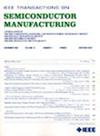Generative AI-Driven Data Augmentation for Robust Virtual Metrology: GANs, VAEs, and Diffusion Models
IF 2.3
3区 工程技术
Q2 ENGINEERING, ELECTRICAL & ELECTRONIC
引用次数: 0
Abstract
Advanced semiconductor manufacturing increasingly depends on Virtual Metrology (VM) for real-time quality monitoring, yet conventional data-driven models rarely capture the scarce or extreme process conditions critical for robust predictions. We propose a Multi-Stage Constrained Data Generative Augmentation (MSC-DGA) framework that integrates Variational Autoencoders (VAE), Normalizing Flows, and Constrained Diffusion to systematically expand coverage of seldom-seen regimes. By embedding strict engineering constraints during generation and applying a two-stage quality filter, MSC-DGA ensures physically plausible synthetic samples. We further present theoretical proofs showing that multi-stage generation can approximate complex sensor distributions while enforcing domain validity, thereby improving coverage and preserving essential process physics. Empirically, we demonstrate the approach on real WBG SiC data, incorporating these curated samples into a Generative Foundation Model (GFA-VM) with few-shot fine-tuning and uncertainty-based active sampling, yielding significant accuracy gains for rarely observed conditions. Experiments confirm notable performance improvements over single-stage augmentation and naive oversampling. By rigorously balancing distribution realism with engineering feasibility, MSC-DGA offers a practical and theoretically grounded advancement for VM, enhancing adaptive control and product quality in next-generation power semiconductor manufacturing.生成人工智能驱动的数据增强鲁棒虚拟计量:gan, VAEs和扩散模型
先进的半导体制造越来越依赖于虚拟计量(VM)进行实时质量监控,然而传统的数据驱动模型很少捕捉到对可靠预测至关重要的稀缺或极端工艺条件。我们提出了一个多阶段约束数据生成增强(MSC-DGA)框架,该框架集成了变分自编码器(VAE)、归一化流和约束扩散,以系统地扩展罕见状态的覆盖范围。通过在生成过程中嵌入严格的工程约束并应用两级质量滤波器,MSC-DGA确保物理上合理的合成样品。我们进一步提出了理论证明,表明多阶段生成可以近似复杂的传感器分布,同时增强域有效性,从而提高覆盖范围并保留基本的过程物理。在经验上,我们在真实的WBG SiC数据上演示了该方法,将这些精心整理的样本纳入生成基础模型(GFA-VM),并进行了少量微调和基于不确定性的主动采样,在很少观察到的条件下获得了显着的精度提升。实验证实了单级增强和朴素过采样的显著性能改进。通过严格平衡分布现实与工程可行性,MSC-DGA为虚拟机提供了实践和理论基础的进步,增强了下一代功率半导体制造的自适应控制和产品质量。
本文章由计算机程序翻译,如有差异,请以英文原文为准。
求助全文
约1分钟内获得全文
求助全文
来源期刊

IEEE Transactions on Semiconductor Manufacturing
工程技术-工程:电子与电气
CiteScore
5.20
自引率
11.10%
发文量
101
审稿时长
3.3 months
期刊介绍:
The IEEE Transactions on Semiconductor Manufacturing addresses the challenging problems of manufacturing complex microelectronic components, especially very large scale integrated circuits (VLSI). Manufacturing these products requires precision micropatterning, precise control of materials properties, ultraclean work environments, and complex interactions of chemical, physical, electrical and mechanical processes.
 求助内容:
求助内容: 应助结果提醒方式:
应助结果提醒方式:


